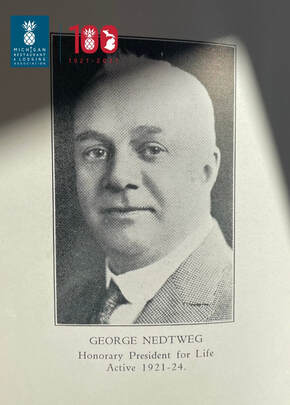The Centennial: A Century of Transformation with 100 Years of History
By: Katie Frankhart

In 1921, George Nedtweg and seven fellow trustees founded the Detroit Caterers Association with the mission to serve, enhance, and nurture the growth and development of Michigan's foodservice industry. An entire century later, that legacy has become the Michigan Restaurant & Lodging Association: a board of 36 directors and 16 staff members in the brick-and-mortar headquarters nestled one block south of the state’s Capitol building dedicated to fulfilling that very mission for its nearly 5,000 members and the 600,000-person Michigan hospitality industry.
Now, in celebration of this 100-year legacy and its continuation, we are looking back at the milestones, victories, hardships, and memorable moments in time — an entire century of history leading up to everything the Michigan Restaurant & Lodging Association has become today and everything it’s strategically poised to become in the future.
Through the decades, you’ll hear from those who are intricate parts of this history, woven into the fabric of this shared journey and story through their personal experiences in the industry — former and current board members, staff members, and business owners alike.
Now, in celebration of this 100-year legacy and its continuation, we are looking back at the milestones, victories, hardships, and memorable moments in time — an entire century of history leading up to everything the Michigan Restaurant & Lodging Association has become today and everything it’s strategically poised to become in the future.
Through the decades, you’ll hear from those who are intricate parts of this history, woven into the fabric of this shared journey and story through their personal experiences in the industry — former and current board members, staff members, and business owners alike.
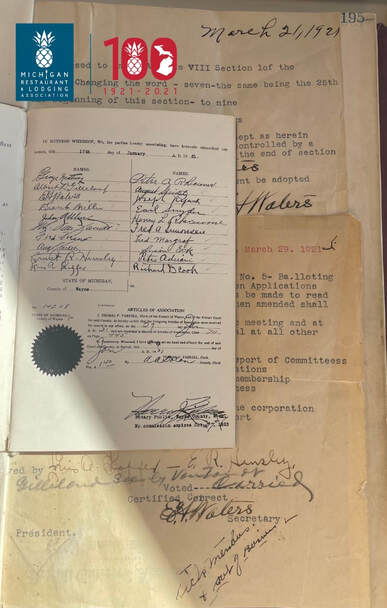
1920s
1921: Detroit Caterers Association is founded
Honorary President for Life George Nedtweg and his six fellow founding board members spent the first decade laying the foundation for what would become a century of providing essential services and advocacy as the recognized leader of the Michigan hospitality industry.
1930s
The Association spent the 1930s establishing itself as a strong voice amongst lawmakers by partaking in and leading lobbying efforts that were critical for the industry’s livelihood.
1933: Association gains legislative influence through expanded lobbying efforts
The board endorsed the Code of Fair Competition for the restaurant industry and sent a member to D.C. to advocate for Michigan’s restaurant industry. The Association also acted on a number of other issues, including the restaurant code of the National Industrial Recovery Act of 1933 (NIRA), ordinances for restaurant licenses and ice cream, and state bills on retail sales tax, liquor and beer, and chain stores tax.
1934: Detroit Caterers Association becomes the Detroit Caterers-Restaurant Association
1939: By the end of the decade, the country was on the precipice of the country’s biggest and deadliest war. While deeply challenging times were ahead for the hospitality industry, the momentum and influence earned by the Association’s relentless efforts were armor against the hardships ahead.
1921: Detroit Caterers Association is founded
Honorary President for Life George Nedtweg and his six fellow founding board members spent the first decade laying the foundation for what would become a century of providing essential services and advocacy as the recognized leader of the Michigan hospitality industry.
1930s
The Association spent the 1930s establishing itself as a strong voice amongst lawmakers by partaking in and leading lobbying efforts that were critical for the industry’s livelihood.
1933: Association gains legislative influence through expanded lobbying efforts
The board endorsed the Code of Fair Competition for the restaurant industry and sent a member to D.C. to advocate for Michigan’s restaurant industry. The Association also acted on a number of other issues, including the restaurant code of the National Industrial Recovery Act of 1933 (NIRA), ordinances for restaurant licenses and ice cream, and state bills on retail sales tax, liquor and beer, and chain stores tax.
1934: Detroit Caterers Association becomes the Detroit Caterers-Restaurant Association
1939: By the end of the decade, the country was on the precipice of the country’s biggest and deadliest war. While deeply challenging times were ahead for the hospitality industry, the momentum and influence earned by the Association’s relentless efforts were armor against the hardships ahead.
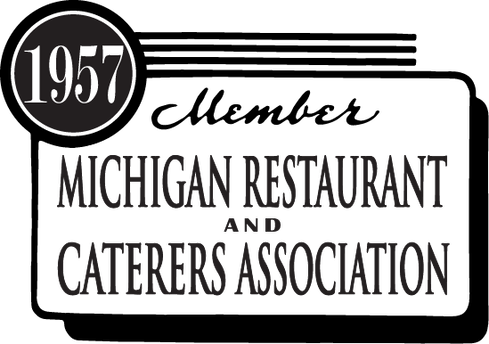
1942: Michigan Restaurateur Magazine is established to increase information available to the industry
1943: Association works to support the war effort as a workforce shortage and food rations threaten the industry
The government continued to call young men to serve in the armed forces, causing a massive workforce shortage. Rations were placed on items like meat, sugar, and butter. The board was also informed that no restaurant would be declared essential, that they could operate with one cook and the public could bring their own containers for food, a plan that would make waitresses unnecessary and cause restaurants to have to stagger their hours. Business owners were facing grave outlooks.
Later that year, it was determined that restaurant services were essential and none of the threats were carried out, mainly due to vigorous work on the part of the Association and its membership, which had increased 46 percent by the end of the year.
Rations, high labor costs, and high employee turnover continued to cause great turmoil for the foodservice industry, but the Association continued to work with government agencies in support of the war effort.
1945: Association creates relief program in response to food rations
Association leaders met with Senator Homer Ferguson and the press, which resulted in the appointment of an emergency food committee to help in the relief of the ration problems. By means of petition cards, they were the only industry representatives able to show that the public disfavored the reduction in restaurant rations.
For the remainder of the decade, the Association and its 1,000 members continued to face a number of problems that would plague the industry for years to come.
1943: Association works to support the war effort as a workforce shortage and food rations threaten the industry
The government continued to call young men to serve in the armed forces, causing a massive workforce shortage. Rations were placed on items like meat, sugar, and butter. The board was also informed that no restaurant would be declared essential, that they could operate with one cook and the public could bring their own containers for food, a plan that would make waitresses unnecessary and cause restaurants to have to stagger their hours. Business owners were facing grave outlooks.
Later that year, it was determined that restaurant services were essential and none of the threats were carried out, mainly due to vigorous work on the part of the Association and its membership, which had increased 46 percent by the end of the year.
Rations, high labor costs, and high employee turnover continued to cause great turmoil for the foodservice industry, but the Association continued to work with government agencies in support of the war effort.
1945: Association creates relief program in response to food rations
Association leaders met with Senator Homer Ferguson and the press, which resulted in the appointment of an emergency food committee to help in the relief of the ration problems. By means of petition cards, they were the only industry representatives able to show that the public disfavored the reduction in restaurant rations.
For the remainder of the decade, the Association and its 1,000 members continued to face a number of problems that would plague the industry for years to come.
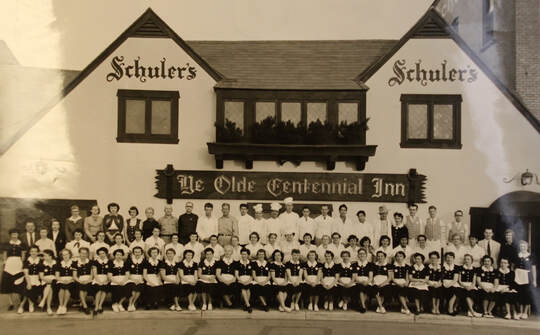
1950s
As WWII came to an end, its impact on the industry was still ever-present, and another war was unfolding. Industry leaders feared the Korean War would have the same devastating impact, gearing up to take action as the 1950s ushered in major legislative battles on minimum wage, disability insurance, labor laws, employment practices, and other county ordinances.
This decade also marked the beginning of the Association’s longest-running member affiliation in its history, one with a distinguished family business led by a man who helped shape the future of the Association and its legislative voice.
1950: Association’s longest-running generational members join
When Win Schuler returned from WWII, he joined the ranks of his family business, which originated when his grandfather bought a small diner in 1906 and later expanded to a motel in 1929. Ready to carry on the legacy, Win turned a bowling alley into what is now the dining room of Schuler’s Restaurant and Pub in Marshall, Michigan, recognized as one of Michigan's 12 most iconic restaurants and the starting place of Win Schuler’s Cheese Spreads.
As WWII came to an end, its impact on the industry was still ever-present, and another war was unfolding. Industry leaders feared the Korean War would have the same devastating impact, gearing up to take action as the 1950s ushered in major legislative battles on minimum wage, disability insurance, labor laws, employment practices, and other county ordinances.
This decade also marked the beginning of the Association’s longest-running member affiliation in its history, one with a distinguished family business led by a man who helped shape the future of the Association and its legislative voice.
1950: Association’s longest-running generational members join
When Win Schuler returned from WWII, he joined the ranks of his family business, which originated when his grandfather bought a small diner in 1906 and later expanded to a motel in 1929. Ready to carry on the legacy, Win turned a bowling alley into what is now the dining room of Schuler’s Restaurant and Pub in Marshall, Michigan, recognized as one of Michigan's 12 most iconic restaurants and the starting place of Win Schuler’s Cheese Spreads.
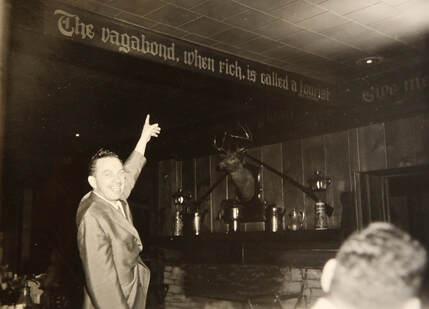 Win Schuler in his restaurant
Win Schuler in his restaurant
Win began 1950 as a new member of the Michigan Restaurant and Caterers Association. Today, the Schuler family name is intricately woven into 70 years of the Association’s history with three generations of membership and two generations of board leadership, including Win’s run as Chair in 1965 and several years on the board. Later, his grandson Larry Schuler would serve several terms as a board member and a one-year term as Chair in 2002.
Continuing the family’s affiliation with the Association today, Larry Schuler reflects on how its political clout, his grandfather’s influence, and three generations of membership have contributed to the mega-success of the Schuler Family business.
“My grandfather recognized how the Association’s role in the day-to-day political activities that were affecting the industry was of tremendous value and that it could help give us a voice in Lansing,” he says.
“In the long run, being involved with the MRLA was the Schuler family’s opportunity to have representation and develop connections with legislators, which made it much easier to make those calls to representatives as a mom and pop shop or someone new to the industry,” Schuler recalls of his family’s experience.
From the moment he joined, Win Schuler fervently encouraged the Association’s political involvement; he was one of the earliest proponents of moving the Association headquarters from Southeast Michigan to the Lansing, insisting that “it made sense to be where the rubber meets the road with political action.”
While the headquarters didn’t make the move to downtown Lansing until 1993, Win Schuler’s influence remained a trusted voice in the Association through the 50s and decades ahead.
1951: Association develops statewide cooperative training program for restaurant employees
In response to the shortage of “skilled help” from WWII, the Association led the implementation of state-wide training programs for restaurant employees, a joint effort run by state sanitarians, educators, and progressive restaurant and hotel operators. The first program of its kind was offered at Michigan State University and later expanded to Wayne State and Ferris State Universities.
Continuing the family’s affiliation with the Association today, Larry Schuler reflects on how its political clout, his grandfather’s influence, and three generations of membership have contributed to the mega-success of the Schuler Family business.
“My grandfather recognized how the Association’s role in the day-to-day political activities that were affecting the industry was of tremendous value and that it could help give us a voice in Lansing,” he says.
“In the long run, being involved with the MRLA was the Schuler family’s opportunity to have representation and develop connections with legislators, which made it much easier to make those calls to representatives as a mom and pop shop or someone new to the industry,” Schuler recalls of his family’s experience.
From the moment he joined, Win Schuler fervently encouraged the Association’s political involvement; he was one of the earliest proponents of moving the Association headquarters from Southeast Michigan to the Lansing, insisting that “it made sense to be where the rubber meets the road with political action.”
While the headquarters didn’t make the move to downtown Lansing until 1993, Win Schuler’s influence remained a trusted voice in the Association through the 50s and decades ahead.
1951: Association develops statewide cooperative training program for restaurant employees
In response to the shortage of “skilled help” from WWII, the Association led the implementation of state-wide training programs for restaurant employees, a joint effort run by state sanitarians, educators, and progressive restaurant and hotel operators. The first program of its kind was offered at Michigan State University and later expanded to Wayne State and Ferris State Universities.

1960s
Challenges from the 1950s trickled into the 60s, “a time of crisis for the restaurant industry,” a former board report noted. The price-wage squeeze was tightening as minimum wage legislation approached the height of its battle, and the shortage of skilled workers grew dire, threatening the livelihood and future of the industry. This wasn’t the first time — or last — that these challenges would rear their head, influencing change and serving as a powerful reminder of history’s tendency to repeat itself.
“Sometimes during current events and social pressures, we don't reflect and learn from our history,” Larry Schuler says. “But I commend the MRLA for learning from its history, listening to members, and focusing on being relevant. Throughout these 100 years, the Association and its board have taken a proactive approach to make strategic, reinforced decisions for the future that build the health of the hospitality business for members.”
1961: Michigan Restaurant and Caterers’ Association becomes the Michigan Restaurant Association
1964: Historic Michigan Minimum Wage Law is enacted
Also known as Act 154 of 1964, the law was "an act to fix minimum wages for employees within the state; to prohibit wage discrimination; to provide for the administration and enforcement of this act; and to prescribe penalties for the violations of this act." This became the guiding law around minimum wage for the State and would play a major role in the Association's minimum wage advocacy throughout the subsequent 50 years.
Challenges from the 1950s trickled into the 60s, “a time of crisis for the restaurant industry,” a former board report noted. The price-wage squeeze was tightening as minimum wage legislation approached the height of its battle, and the shortage of skilled workers grew dire, threatening the livelihood and future of the industry. This wasn’t the first time — or last — that these challenges would rear their head, influencing change and serving as a powerful reminder of history’s tendency to repeat itself.
“Sometimes during current events and social pressures, we don't reflect and learn from our history,” Larry Schuler says. “But I commend the MRLA for learning from its history, listening to members, and focusing on being relevant. Throughout these 100 years, the Association and its board have taken a proactive approach to make strategic, reinforced decisions for the future that build the health of the hospitality business for members.”
1961: Michigan Restaurant and Caterers’ Association becomes the Michigan Restaurant Association
1964: Historic Michigan Minimum Wage Law is enacted
Also known as Act 154 of 1964, the law was "an act to fix minimum wages for employees within the state; to prohibit wage discrimination; to provide for the administration and enforcement of this act; and to prescribe penalties for the violations of this act." This became the guiding law around minimum wage for the State and would play a major role in the Association's minimum wage advocacy throughout the subsequent 50 years.
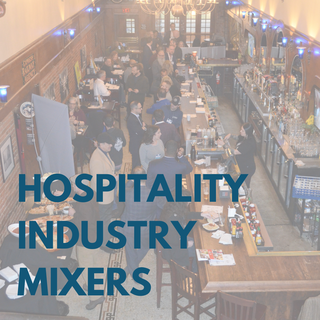
1967: Association hosts its first trade show
On October 10-12, 1967, the Association hosted its first two-day trade show in Detroit, the Annual Michigan and Great Lakes Restaurant Equipment and Food Service Exposition. It was later renamed the Michigan Restaurant Show, then the Michigan Restaurant & Lodging Show. The annual trade show would go on to be a longstanding annual tradition for the Association, which celebrated its 50th anniversary in 2017.
On October 10-12, 1967, the Association hosted its first two-day trade show in Detroit, the Annual Michigan and Great Lakes Restaurant Equipment and Food Service Exposition. It was later renamed the Michigan Restaurant Show, then the Michigan Restaurant & Lodging Show. The annual trade show would go on to be a longstanding annual tradition for the Association, which celebrated its 50th anniversary in 2017.
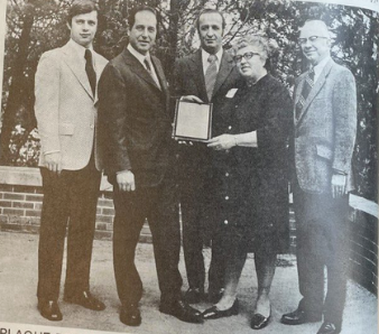 Chair of the Board, Katie Shield, at the 3rd Annual Capitol Day event
Chair of the Board, Katie Shield, at the 3rd Annual Capitol Day event
1970s
For the Association, the 70s was a decade of progress, enacting change, and new leadership as industry leaders — male and female — established and exercised their voices at the State Capitol and in the Association boardroom.
1970: First Michigan Restaurateur Day is hosted at the State Capitol
Michigan Restaurateurs Day was created to bring members together in the State Capitol for a day of discussions and activities amongst fellow restaurateurs. Now known as Capitol Day, it has turned into the Association’s premier event that allows members an opportunity to meet with elected officials face-to-face and discuss major issues facing the hospitality industry.
1973: Kathleen M. Shield becomes the first female Chair of the Board
1976: Michigan Restaurateur Magazine is renamed to Michigan Hospitality
For the Association, the 70s was a decade of progress, enacting change, and new leadership as industry leaders — male and female — established and exercised their voices at the State Capitol and in the Association boardroom.
1970: First Michigan Restaurateur Day is hosted at the State Capitol
Michigan Restaurateurs Day was created to bring members together in the State Capitol for a day of discussions and activities amongst fellow restaurateurs. Now known as Capitol Day, it has turned into the Association’s premier event that allows members an opportunity to meet with elected officials face-to-face and discuss major issues facing the hospitality industry.
1973: Kathleen M. Shield becomes the first female Chair of the Board
1976: Michigan Restaurateur Magazine is renamed to Michigan Hospitality
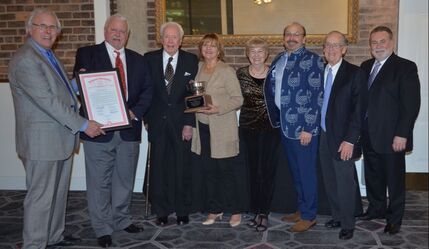 Janet Belcoure winning the Distinguished Service Award from the Association pictured with previous DSA Winners.
Janet Belcoure winning the Distinguished Service Award from the Association pictured with previous DSA Winners.
1978: Elenor Kilda becomes second female Chair of the Board
Just as the Association’s second female Chair Elenor Kilda began her term in 1978, another future female leader Janet Belcoure was stepping into the role of operator of her family’s restaurant, Roma Cafe, in Detroit’s Eastern Market. Belcoure would go on to be elected to Chair in 2012 as the fourth woman in the Association’s history to hold the position. She fondly reflects on her experience as part of it.
“You had to be a person that either owned your own business or was in the hierarchy of chain businesses and there just weren't a lot of women in the industry who fell into that category,” she recalls. “So really, it was an honor, and although I was only one of two women at the table at my first board meeting, I never really felt intimidated.”
Belcoure shares how she believes female leadership impacts the Association and benefits the industry as a whole. She says men and women have completely different leadership styles — not one better or worse than the other — but, for a long time, the world had been missing out on some of the qualities that women leaders bring to the table.
“Women have totally different experiences and approaches to problem-solving, we face certain challenges in our lives and we've had to learn how to persevere and work around them,” she says. “This mentality helps in any business or industry because I can guarantee you're going to come into challenges, and if you give up the first time something doesn't work, you're not going to be successful.”
She says she faced some challenges and people who didn’t trust her leadership, but it just made her realize that she had to work hard and learn through valuable discussions and picking the brains of those who knew more than her.
“I became more confident as a leader, and I learned that you can lead without knowing all the answers,” she says. “A leader is somebody that can work with a team and listen to figure things out and do what’s best for our industry.”
Just as the Association’s second female Chair Elenor Kilda began her term in 1978, another future female leader Janet Belcoure was stepping into the role of operator of her family’s restaurant, Roma Cafe, in Detroit’s Eastern Market. Belcoure would go on to be elected to Chair in 2012 as the fourth woman in the Association’s history to hold the position. She fondly reflects on her experience as part of it.
“You had to be a person that either owned your own business or was in the hierarchy of chain businesses and there just weren't a lot of women in the industry who fell into that category,” she recalls. “So really, it was an honor, and although I was only one of two women at the table at my first board meeting, I never really felt intimidated.”
Belcoure shares how she believes female leadership impacts the Association and benefits the industry as a whole. She says men and women have completely different leadership styles — not one better or worse than the other — but, for a long time, the world had been missing out on some of the qualities that women leaders bring to the table.
“Women have totally different experiences and approaches to problem-solving, we face certain challenges in our lives and we've had to learn how to persevere and work around them,” she says. “This mentality helps in any business or industry because I can guarantee you're going to come into challenges, and if you give up the first time something doesn't work, you're not going to be successful.”
She says she faced some challenges and people who didn’t trust her leadership, but it just made her realize that she had to work hard and learn through valuable discussions and picking the brains of those who knew more than her.
“I became more confident as a leader, and I learned that you can lead without knowing all the answers,” she says. “A leader is somebody that can work with a team and listen to figure things out and do what’s best for our industry.”
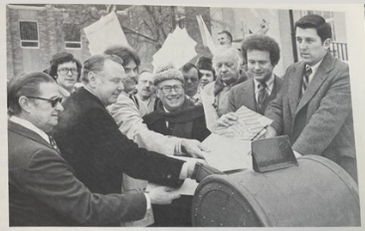 1978 Mail-a-Menu event
1978 Mail-a-Menu event
1978: Operation “Mail-a-Menu” takes place in opposition of a major tax law proposal
The Association and other restaurant associations from across the country banded together for operation "Mail-A-Menu,” flooding the mailboxes of President Carter and Congress with torn menus to represent their opposition to the proposal that the price of a business meal and drinks — the so-called “three-martini lunch” — be cut to 50 percent.
The Association and other restaurant associations from across the country banded together for operation "Mail-A-Menu,” flooding the mailboxes of President Carter and Congress with torn menus to represent their opposition to the proposal that the price of a business meal and drinks — the so-called “three-martini lunch” — be cut to 50 percent.

1980s
The 1980s was a catalytic decade for the Association, one reflective of what was to come in a rapidly growing and changing industry.
1982: Association receives more than 100 applications for educational scholarships
Going into the 1980s, the Association focused on building a future pipeline of industry leaders by re-focusing on education. To do so, it started accepting applications for educational scholarships. By 1984, the need and demand for industry-specific educational opportunities prompted the Association to prioritize hosting accessible statewide educational seminars.
Michael Gibbons, who served as Chair of the Board in 1989 and 1990, remembers this time as one when the value of an educational foundation was becoming undeniably evident, and it set the stage for the future of one.
“We had a multi-faceted goal of creating a pool of young career-oriented people who would recognize the opportunities that our industry offered,” Gibbons says. “Creating an educational foundation also served to put a halo on the lobbying efforts of the Association.”
The retired President & CEO of Mainstreet Ventures, Inc. has also served as Chair of the National Restaurant Association (NRA) Board and sat on the board of the NRA Educational Foundation. During his term as the MRLA’s Chairman, he and the Board worked with the NRA to implement the ProStart program in high schools and vocational schools throughout Michigan. The nationwide, two-year high school program unites the classroom and the industry by developing the best and brightest talent into restaurant and foodservice industry leaders.
Today, there are more than 125,000 students in the nationwide program, and 5,000 students in 70 high schools and career centers across Michigan use the ProStart curriculum.
The 1980s was a catalytic decade for the Association, one reflective of what was to come in a rapidly growing and changing industry.
1982: Association receives more than 100 applications for educational scholarships
Going into the 1980s, the Association focused on building a future pipeline of industry leaders by re-focusing on education. To do so, it started accepting applications for educational scholarships. By 1984, the need and demand for industry-specific educational opportunities prompted the Association to prioritize hosting accessible statewide educational seminars.
Michael Gibbons, who served as Chair of the Board in 1989 and 1990, remembers this time as one when the value of an educational foundation was becoming undeniably evident, and it set the stage for the future of one.
“We had a multi-faceted goal of creating a pool of young career-oriented people who would recognize the opportunities that our industry offered,” Gibbons says. “Creating an educational foundation also served to put a halo on the lobbying efforts of the Association.”
The retired President & CEO of Mainstreet Ventures, Inc. has also served as Chair of the National Restaurant Association (NRA) Board and sat on the board of the NRA Educational Foundation. During his term as the MRLA’s Chairman, he and the Board worked with the NRA to implement the ProStart program in high schools and vocational schools throughout Michigan. The nationwide, two-year high school program unites the classroom and the industry by developing the best and brightest talent into restaurant and foodservice industry leaders.
Today, there are more than 125,000 students in the nationwide program, and 5,000 students in 70 high schools and career centers across Michigan use the ProStart curriculum.
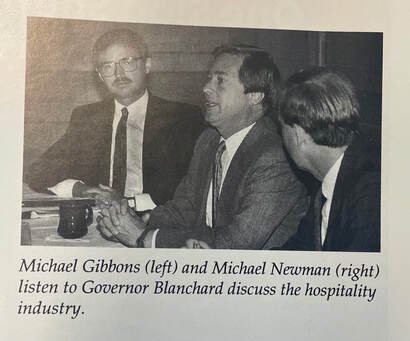
1986: Association advocates to decrease the requirements of a bill mandating smoking in restaurants
Public Act 198 of 1986 — The Michigan Clean Indoor Air Act — heavily restricted indoor tobacco use in public spaces, including restaurants. Knowing this would drastically impact the number of patrons and livelihood of restaurants, the Association successfully advocated to decrease the bill’s requirements from mandating that 50 percent of a restaurant be designated as non-smoking to only three tables.
1987: Michigan Hospitality Magazine is renamed to Michigan Restaurateur
1987: Association headquarters move from Southeast Michigan to Okemos to be closer to the Capitol City
Ruth Ellen Mayhall, the Association’s executive director at the time, recommended moving offices to Lansing in order to improve our visibility and strengthen the Association’s position as a lobbying organization.
Gibbons recalls hearing Dr. Ron Cichy, and MSU professor who was passionate about educating legislators about the industry, say, “Until we can convince the lawmakers that we are not the industry of minimum wage, but the industry of maximum opportunity, we are spinning our wheels.”
“Someone once said, ‘If you’re not at the table, you’re on the menu!’,” Gibbons quips. “Our move to Lansing made sure we were at the table.”
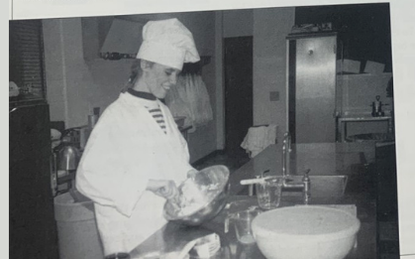
1990s
A new foundation as a pipeline for education, a new fund supporting self-insured workers, and new headquarters near the State’s Capitol ... 1990 was the decade of all new things for the Association.
1990: Michigan Restaurant Association Educational Support Foundation is established
On December 5, 1990, the Michigan Restaurant Association Educational/Scholarship Committee became the Michigan Restaurant Association Educational Support Foundation, which was established to provide support to current and future employees through scholarships and educational and vocational opportunities.
Over the following three decades, the Foundation would grow by bounds and expand its support. Today, in 2021, it is known as the Michigan Restaurant & Lodging Association Educational Foundation (MRLAEF) and has three comprehensive educational and vocational programs — ProStart, Hospitality & Tourism Management, and Restaurant Ready — as well as an emergency employee relief fund and an expansive list of other industry resources.
A new foundation as a pipeline for education, a new fund supporting self-insured workers, and new headquarters near the State’s Capitol ... 1990 was the decade of all new things for the Association.
1990: Michigan Restaurant Association Educational Support Foundation is established
On December 5, 1990, the Michigan Restaurant Association Educational/Scholarship Committee became the Michigan Restaurant Association Educational Support Foundation, which was established to provide support to current and future employees through scholarships and educational and vocational opportunities.
Over the following three decades, the Foundation would grow by bounds and expand its support. Today, in 2021, it is known as the Michigan Restaurant & Lodging Association Educational Foundation (MRLAEF) and has three comprehensive educational and vocational programs — ProStart, Hospitality & Tourism Management, and Restaurant Ready — as well as an emergency employee relief fund and an expansive list of other industry resources.

1992: Michigan Restaurant and Lodging Fund is established
Formed on December 1, 1992, as the Michigan Restaurant Association Self-Insured Workers' Compensation Fund (MRA SIWCF), the fund was endorsed as a program available exclusively to members of the Association. Initially comprised of 120 members, the fund grew quickly and soon had members in every county in Michigan. By 1999 it had expanded to include members of the Michigan Lodging and Tourism Association and changed its name to the Michigan Restaurant & Lodging Fund (MRL Fund).
Today the Fund has over 1,000 members representing more than 2,500 of the finest restaurant and hotel operators in every corner of the state.
1993: Association purchases building in downtown Lansing as new headquarters
Fulfilling Winn Schuler’s long-held dream nearly five decades later, the Association headquarters moved to Lansing to be in the heart of legislative activity just in time for the turn of the century.
That same year, the Association also welcomed its new leader, Rob Gifford, whose industry experience came from the world of advocacy. After spending his career on Capitol Hill with the U.S. Senate as a lobbyist for the National Restaurant Association (NRA), he was recruited to lead the MRA where he would serve as CEO and President for 18 years until 2011.
“We went from being a Detroit-based organization renting space to having state-of-the-art headquarters in the heart of Lansing,” Gifford says, calling the physical transformation a major milestone that corresponded with all kinds of other growth during his tenure.

1994: Public Act 242 of 1993 goes into effect, limiting smoking in restaurants
By 1994, Public Act 242 required restaurants with 50 seats or more to provide at least 50% nonsmoking seating. From here on, the smoking mandates and bans became a main focus and major battle for the Association and Michigan hospitality industry.
When Rob Gifford thinks of the 10-plus year execution against smoking bans, he thinks of the military parlance term “rearguard action,” which is when opposing forces are held at bay to protect troops so they can have an orderly retreat.
“It was clear that everyone was eventually going to move in the direction of banning smoking inside restaurants, but we wanted to make certain that the industry was ready for it,” he says. “We were active early on in making sure it was happening fairly across the state, not on a city-by-city basis that would disproportionately impact establishments in a very problematic way.”
In the mid-1990s, the Wayne County Commissioner and the City of Detroit began pursuing a county-wide smoking ban. Janet Belcoure knew this would take a hard hit on Detroit restaurants like her own, Roma Cafe, by driving customers away to the surrounding counties where smoking wasn’t prohibited. Gifford reached out to her asking if she would be willing to attend a Wayne County Commissioners meeting and voice her opinion — the beginning of her road to the Chair of the Board.
“The Association didn’t have much representation in Detroit at the time and was looking for members in the area to help push back and advocate for restaurants in the area,” Belcoure recalls. “I had a strong opinion about this non-smoking ban, so I agreed to appear at the County Commissioners’ office to share my thoughts and interview with some local press.”
Gifford recognized that Belcoure’s voice and support were influential in the efforts. “With the help of Jan and other restaurant owners, we were successful in convincing the Wayne County Commission and the City of Detroit that doing a smoking ban would have been really injurious to Wayne County restaurants and benefited restaurants in Oakland and Macomb Counties,” he says. He would go on to recruit Belcoure for the Board of Directors, viewing her as a perfect fit.
“I had a hard enough time running my business on my own, and I knew I needed help from Lansing and needed to know what's going on in the industry so I could help,” she says. “I felt it was my duty to protect Detroit restaurants and give them a voice in all industry matters, particularly ones like the smoking ban.”
Belcoure accepted the standing invitation for a seat on the Board of Directors in 2006. She subsequently became Treasurer in 2010, Vice Chair in 2011, and began her term as Chair in 2012.
By 1994, Public Act 242 required restaurants with 50 seats or more to provide at least 50% nonsmoking seating. From here on, the smoking mandates and bans became a main focus and major battle for the Association and Michigan hospitality industry.
When Rob Gifford thinks of the 10-plus year execution against smoking bans, he thinks of the military parlance term “rearguard action,” which is when opposing forces are held at bay to protect troops so they can have an orderly retreat.
“It was clear that everyone was eventually going to move in the direction of banning smoking inside restaurants, but we wanted to make certain that the industry was ready for it,” he says. “We were active early on in making sure it was happening fairly across the state, not on a city-by-city basis that would disproportionately impact establishments in a very problematic way.”
In the mid-1990s, the Wayne County Commissioner and the City of Detroit began pursuing a county-wide smoking ban. Janet Belcoure knew this would take a hard hit on Detroit restaurants like her own, Roma Cafe, by driving customers away to the surrounding counties where smoking wasn’t prohibited. Gifford reached out to her asking if she would be willing to attend a Wayne County Commissioners meeting and voice her opinion — the beginning of her road to the Chair of the Board.
“The Association didn’t have much representation in Detroit at the time and was looking for members in the area to help push back and advocate for restaurants in the area,” Belcoure recalls. “I had a strong opinion about this non-smoking ban, so I agreed to appear at the County Commissioners’ office to share my thoughts and interview with some local press.”
Gifford recognized that Belcoure’s voice and support were influential in the efforts. “With the help of Jan and other restaurant owners, we were successful in convincing the Wayne County Commission and the City of Detroit that doing a smoking ban would have been really injurious to Wayne County restaurants and benefited restaurants in Oakland and Macomb Counties,” he says. He would go on to recruit Belcoure for the Board of Directors, viewing her as a perfect fit.
“I had a hard enough time running my business on my own, and I knew I needed help from Lansing and needed to know what's going on in the industry so I could help,” she says. “I felt it was my duty to protect Detroit restaurants and give them a voice in all industry matters, particularly ones like the smoking ban.”
Belcoure accepted the standing invitation for a seat on the Board of Directors in 2006. She subsequently became Treasurer in 2010, Vice Chair in 2011, and began her term as Chair in 2012.
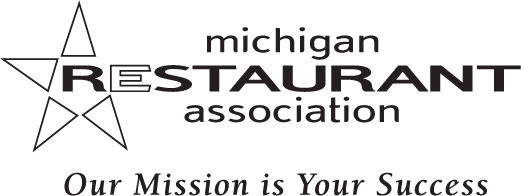
1997: Association advocates to project industry from the State’s most comprehensive smoke-free ordinance
On July 28, 1997, the Marquette, Michigan City Council adopted an ordinance prohibiting smoking in most worksites and public accommodations, including restaurants. At the time, this was the most comprehensive smoke-free ordinance in the State. Restaurants were also to go smoke-free on January 1, 1999, but the Association and some local restaurants filed a lawsuit to prohibit implementation of the restaurant section of the law.
Gifford shares that the Association worked to incorporate language into the State’s health code that precluded a local jurisdiction from having its own smoking ban.
“We challenged that Marquette ruling relying on the language we'd inserted into legislation to preclude the city from doing what Wayne County was trying to do,” he says. “We were successful in keeping any city in Michigan from having its own smoking ban, which we think protected a lot of operators.”
On January 7, 1999, a County Circuit Court judge ruled that the restaurant portion of the ordinance was preempted by state law, and therefore enjoined its implementation. This decision was appealed by Marquette to the Michigan Court of Appeals, which issued a ruling on March 13, 2001, upholding the lower court decision and stating that localities are preempted by state law from totally banning smoking in restaurants, but allowing localities to regulate smoking in restaurants to some extent.
Through this victory, Gifford says the Association ensured that any smoking ban was going to be a comprehensive statewide approach that equally applied to all hospitality businesses in the State without any exceptions based on size, location, or any other factors.
On July 28, 1997, the Marquette, Michigan City Council adopted an ordinance prohibiting smoking in most worksites and public accommodations, including restaurants. At the time, this was the most comprehensive smoke-free ordinance in the State. Restaurants were also to go smoke-free on January 1, 1999, but the Association and some local restaurants filed a lawsuit to prohibit implementation of the restaurant section of the law.
Gifford shares that the Association worked to incorporate language into the State’s health code that precluded a local jurisdiction from having its own smoking ban.
“We challenged that Marquette ruling relying on the language we'd inserted into legislation to preclude the city from doing what Wayne County was trying to do,” he says. “We were successful in keeping any city in Michigan from having its own smoking ban, which we think protected a lot of operators.”
On January 7, 1999, a County Circuit Court judge ruled that the restaurant portion of the ordinance was preempted by state law, and therefore enjoined its implementation. This decision was appealed by Marquette to the Michigan Court of Appeals, which issued a ruling on March 13, 2001, upholding the lower court decision and stating that localities are preempted by state law from totally banning smoking in restaurants, but allowing localities to regulate smoking in restaurants to some extent.
Through this victory, Gifford says the Association ensured that any smoking ban was going to be a comprehensive statewide approach that equally applied to all hospitality businesses in the State without any exceptions based on size, location, or any other factors.
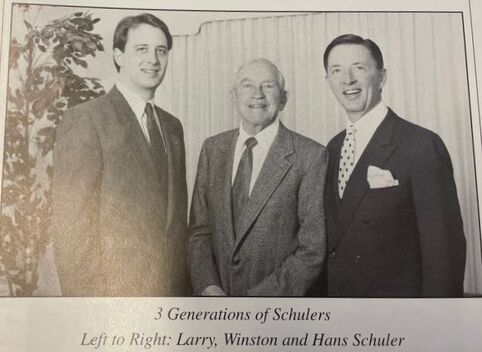
2000s
Facing a new and exciting century, the Association broke old molds to make room for forward-thinking leadership and strategic change to build a completely new vision for the future.
During Larry Schuler’s term as Chair of the Board in 2002, Rob Gifford initiated a series of strategic planning sessions, which Schuler says prepared the Association for the 21st century.
“Gifford was definitely a proponent of smart strategic change, ” Schuler recalls. “We were operating very much like we were in the 60s, 70s, and 80s when he came in, and under his leadership, we worked to ensure that our Board of Directors wasn’t just an advisory board that caught up on a quarterly basis through a report. We wanted to have more strategic involvement in the future.”
In terms of strategy, Gifford says the Board created a compelling vision about why the Association and its vision mattered, why advocacy mattered.
“During my tenure, there was a real revolution of the organization as a political force in the State,” Gifford recalls. “We built a strong grassroots network, a really strong public policy team, and a much more heightened profile on advocacy issues.”
Facing a new and exciting century, the Association broke old molds to make room for forward-thinking leadership and strategic change to build a completely new vision for the future.
During Larry Schuler’s term as Chair of the Board in 2002, Rob Gifford initiated a series of strategic planning sessions, which Schuler says prepared the Association for the 21st century.
“Gifford was definitely a proponent of smart strategic change, ” Schuler recalls. “We were operating very much like we were in the 60s, 70s, and 80s when he came in, and under his leadership, we worked to ensure that our Board of Directors wasn’t just an advisory board that caught up on a quarterly basis through a report. We wanted to have more strategic involvement in the future.”
In terms of strategy, Gifford says the Board created a compelling vision about why the Association and its vision mattered, why advocacy mattered.
“During my tenure, there was a real revolution of the organization as a political force in the State,” Gifford recalls. “We built a strong grassroots network, a really strong public policy team, and a much more heightened profile on advocacy issues.”

Under Gifford’s leadership throughout the 90s and 00s, the Association’s PAC fundraising grew tenfold and turned into one of the 10 largest trade association PACs in Michigan, and the Association had been voted as one of the top five lobbying groups in Michigan. The Association’s workers compensation company grew to over $10 million worth of premiums and 1000-plus members, and membership more than doubled from 2,000 restaurants to 4,200.
“Michigan’s hospitality industry is a dynamic, amazing industry to be in, and I believe that the industry now gets the respect it deserves largely due to the success of the MRLA,” Gifford says proudly. “The fact that I've been some small part of building and strengthening the presence of the Association over time is something that feels pretty good.”
2002: Ingham County Commissioners pass Michigan’s first county-wide smoking ban
Because of the Association’s earlier advocacy efforts and the state court decision, the regulation did not include a ban on smoking in restaurants and bars.
2006: Association demolishes headquarters to make way for a new state-of-the-art facility, reopening in 2007
2009: Governor Granholm signs statewide smoking ban into law
The smoke-free law banned indoor smoking in almost all workplaces and public places, including restaurants, across the state, making the law uniform for all restaurants — exactly what the Association had advocated for.
“Michigan’s hospitality industry is a dynamic, amazing industry to be in, and I believe that the industry now gets the respect it deserves largely due to the success of the MRLA,” Gifford says proudly. “The fact that I've been some small part of building and strengthening the presence of the Association over time is something that feels pretty good.”
2002: Ingham County Commissioners pass Michigan’s first county-wide smoking ban
Because of the Association’s earlier advocacy efforts and the state court decision, the regulation did not include a ban on smoking in restaurants and bars.
2006: Association demolishes headquarters to make way for a new state-of-the-art facility, reopening in 2007
2009: Governor Granholm signs statewide smoking ban into law
The smoke-free law banned indoor smoking in almost all workplaces and public places, including restaurants, across the state, making the law uniform for all restaurants — exactly what the Association had advocated for.
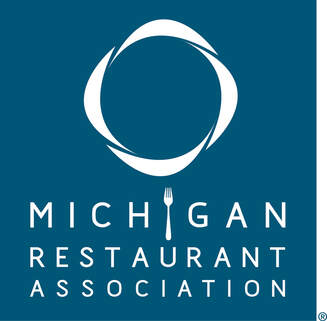
2010s
With an entirely new vision for the future, the Association entered 2010 ready for its continued transformation, from major legislative victories to two historical mergers that changed the entire trajectory of the Association’s future.
2010: Statewide smoking ban goes into effect
2014: Association prevents a ballot initiative, defusing the elimination of tip credit
The Minimum Wage Law of 1964 is repealed by the Workforce Opportunity Wage Act, Public Act 138 of 2014. The Association's advocacy work prevented a ballot initiative that would eliminate the tip credit and hurt the hospitality industry — the State's second largest employer.
With an entirely new vision for the future, the Association entered 2010 ready for its continued transformation, from major legislative victories to two historical mergers that changed the entire trajectory of the Association’s future.
2010: Statewide smoking ban goes into effect
2014: Association prevents a ballot initiative, defusing the elimination of tip credit
The Minimum Wage Law of 1964 is repealed by the Workforce Opportunity Wage Act, Public Act 138 of 2014. The Association's advocacy work prevented a ballot initiative that would eliminate the tip credit and hurt the hospitality industry — the State's second largest employer.

2017: Association merges with the Detroit Restaurant Association (DRA)
Formed as a local chapter of the Michigan Restaurant Association (MRA), the DRA was tasked with representing the local interests of the nearly 1,000 restaurants operating in Michigan’s largest city.
Brad Keen, Senior Vice President of Food and Beverage for Boyne Resorts, led the merger while serving his second term as Chair of the Board in 2017. He recalls the growth of Southeast Michigan's dining scene, particularly in Detroit, and the time deficit that prevented the Association from being in the area where it was all happening; he saw an opportunity for both parties to unify and amplify the industry’s voice and presence in Michigan.
“We’re stronger in numbers, and they needed a larger voice in the city, and our political clout in Lansing gave them a lot of opportunities that they probably didn't have before,” he says. “It made all the sense in the world to bring them on board.”
The merger became official in March 2017. In the fall of 2018, DRA joined the state association and transitioned to the Detroit Restaurant & Lodging Association (DRLA).
Timothy Tharp, owner of Grand Trunk Pub, co-founder and inaugural Chairman of the DLRA, looks back on the organic creation of the city-specific association, “We simply needed more political advocacy on the local level for restaurants. Too much change was happening that directly affected our businesses, and no one was asking for our input.”
“The situation in our city was rapidly changing each day, so in order for restaurants to be heard, we needed to organize together to ensure our own representation and engagement,” adds Tharp. “There’s no such thing as a day off for restaurateurs, so we found ourselves wanting to take so much action, but limited in the time we could dedicate away from restaurants, and as such came the partnership with the Michigan Restaurant Association.”
2018: Association prevents another ballot initiative, saving the Tip Credit for a second time
The Association led the charge to fend off another disastrous Minimum Wage mandate that would have repealed Michigan's Tip Credit, successfully preventing the proposal from reaching the November 2018 general election ballot. On December 4, 2018, the Michigan Legislature voted overwhelmingly to pass SB 1171 (now Public Act 368 of 2018) into law to protect Michigan's Tip Credit and create a responsible and long-term business-friendly approach to the minimum wage law.

2018: Michigan Restaurant Association becomes the Michigan Restaurant & Lodging Association
The Michigan Restaurant Association and Check In Michigan (formerly the Michigan Lodging & Tourism Association) announced a merging of the two statewide associations to form a unified and commanding voice for the hospitality industry in Michigan.
For Brad Keen, this was the second major merger he helped lead and one he strongly advocated for.
“The relevance of the MRLA in our state is for it to be solvent,” he says. “The Association needs to be strong, needs to have one large, unified voice so that when things attack our industry — which happens every day, whether it’s in lodging or food and beverage — we have the presence to address them and fight back.”
At the time of the merger, Keen had just passed on the Chairman torch to Todd Callewaert, CEO of Island House Hotel and his family’s hospitality business based on Mackinac Island. As a fellow lodging and restaurant leader and operator, he’s long shared the value of collaboration amongst the two units of the industry.
The Michigan Restaurant Association and Check In Michigan (formerly the Michigan Lodging & Tourism Association) announced a merging of the two statewide associations to form a unified and commanding voice for the hospitality industry in Michigan.
For Brad Keen, this was the second major merger he helped lead and one he strongly advocated for.
“The relevance of the MRLA in our state is for it to be solvent,” he says. “The Association needs to be strong, needs to have one large, unified voice so that when things attack our industry — which happens every day, whether it’s in lodging or food and beverage — we have the presence to address them and fight back.”
At the time of the merger, Keen had just passed on the Chairman torch to Todd Callewaert, CEO of Island House Hotel and his family’s hospitality business based on Mackinac Island. As a fellow lodging and restaurant leader and operator, he’s long shared the value of collaboration amongst the two units of the industry.
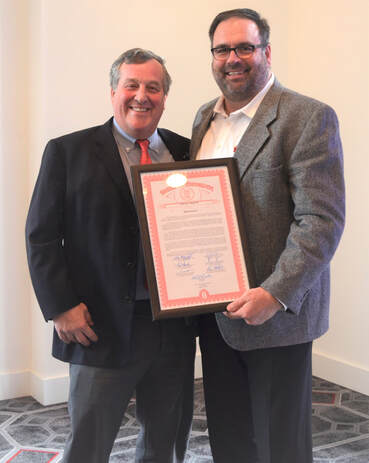 2017 Chairman Brad Keen (right) passing Chairman roles to 2018 Chairman Todd Callewaert (left)
2017 Chairman Brad Keen (right) passing Chairman roles to 2018 Chairman Todd Callewaert (left)
“In 2018 we had a lot of irons in the fire and our plate was full,” Callewaert recalls of his early days as Chairman. With a fight against two ballot proposals, paid sick leave, a huge minimum wage increase, along with a governor's race and key legislators needing assistance for the election cycle, the board wasn’t looking to add anything else to its place.
But the opportunity to migrate into lodging arose through conversations with new board members of Check In Michigan, the newly rebranded Michigan Lodging and Tourism Association. Since both Keen’s first term as Chairman and Callewart’s start on the board in 2013, there had always been discussion about adding lodging to expand the Association’s reach in Lansing.
“The MRA was one of the top associations in Lansing, leading the way for restaurants in education, marketing, member value, and food safety as an organization with over 4,000 members and a staff of 18 industry led by a strong President and CEO,” Callewart says of why the Board felt it was time to follow 23 other states in combining hotels and restaurants into one organization.
As an industry leader himself, Callewart’s father always told him, “If you are not growing, you will die." During his time as Chair of the Board, Todd Callewart remained steadfast on adhering to that lesson as the leader through this merger.
“Through this merger, the Board moved the Association ahead to better utilize the amazing staff we had assembled and build our clout in the state to better serve our members,” he says. “It was quite the ride, but we did it.”
But the opportunity to migrate into lodging arose through conversations with new board members of Check In Michigan, the newly rebranded Michigan Lodging and Tourism Association. Since both Keen’s first term as Chairman and Callewart’s start on the board in 2013, there had always been discussion about adding lodging to expand the Association’s reach in Lansing.
“The MRA was one of the top associations in Lansing, leading the way for restaurants in education, marketing, member value, and food safety as an organization with over 4,000 members and a staff of 18 industry led by a strong President and CEO,” Callewart says of why the Board felt it was time to follow 23 other states in combining hotels and restaurants into one organization.
As an industry leader himself, Callewart’s father always told him, “If you are not growing, you will die." During his time as Chair of the Board, Todd Callewart remained steadfast on adhering to that lesson as the leader through this merger.
“Through this merger, the Board moved the Association ahead to better utilize the amazing staff we had assembled and build our clout in the state to better serve our members,” he says. “It was quite the ride, but we did it.”

2020-2021
The COVID-19 pandemic wreaked havoc on the industry, accelerating change, transforming hospitality as we once knew it, and, sadly, decimating parts of it. While these have been the most devastating and challenging two years the Association — and the industry — has ever faced, they also mark a time of great triumph, adaptation, and resilience.
Proposals with solutions to prevent catastrophic loss in the industry; reintegration roadmaps for restaurants’ and lodges’ safe, successful reopening; a safe dining commitment, employee relief fund, and new educational programs; Board and staff members acting as a collective political powerhouse to advocate on behalf of the Michigan hospitality when it needed it most. These past two years have been the most impactful and productive years in the Association’s history.
January 8, 2020: Association launches Women In Hospitality Leadership (WIHL)
Women in Hospitality in Leadership was a major milestone for the Association’s commitment to fostering more female industry leaders. With chapters in Lansing and Grand Rapids, the mission of WIHL is to build community through education, mentorship, and social responsibility to women in Michigan’s hospitality industry.
The COVID-19 pandemic wreaked havoc on the industry, accelerating change, transforming hospitality as we once knew it, and, sadly, decimating parts of it. While these have been the most devastating and challenging two years the Association — and the industry — has ever faced, they also mark a time of great triumph, adaptation, and resilience.
Proposals with solutions to prevent catastrophic loss in the industry; reintegration roadmaps for restaurants’ and lodges’ safe, successful reopening; a safe dining commitment, employee relief fund, and new educational programs; Board and staff members acting as a collective political powerhouse to advocate on behalf of the Michigan hospitality when it needed it most. These past two years have been the most impactful and productive years in the Association’s history.
January 8, 2020: Association launches Women In Hospitality Leadership (WIHL)
Women in Hospitality in Leadership was a major milestone for the Association’s commitment to fostering more female industry leaders. With chapters in Lansing and Grand Rapids, the mission of WIHL is to build community through education, mentorship, and social responsibility to women in Michigan’s hospitality industry.
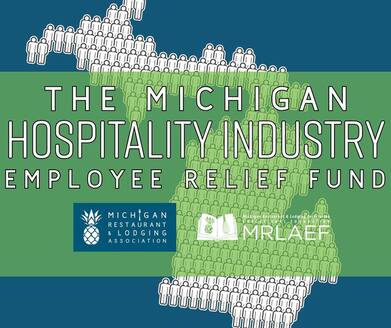
April 6, 2020: Educational Foundation creates employee relief program
The Michigan Hospitality Industry Employee Relief Fund was designed to assist employees of Michigan’s restaurant and lodging industries in need of support due to the COVID-19 pandemic.
Amanda Smith, Executive Vice President of Education at the MRLA, says that although the relief fund was started for those in need of support due to the COVID-19 pandemic, it will continue to assist hospitality employees in times of crisis, providing emergency assistance for unthinkable tragedies like house fires, the loss of a family member, or a sick child.
April 14, 2020: Association leads push to launch creative solution for liquor licensees
When an executive order authorized the Liquor Control Commission to buy back any alcoholic spirits inventory purchased by premises licensees, the Association helped develop a contact-free buyback opportunity for shuttered restaurants and bars that had no other way of generating revenue from their alcoholic spirits during the pandemic.
The Association developed creative solutions for “Liquor to Go,” working diligently with Michigan lawmakers to swiftly introduce and pass Public Act 125 of 2020 that allows mixed drinks and other distilled spirits cocktails to be sold to-go or delivered to a customer’s home.
September 21, 2020: Association receives $2.5M grant to help hospitality workers
The grant received from the Michigan Department of Treasury, which was appropriated through the Employee Relief Fund, provided continued support for industry workers who were financially impacted by the COVID-19 pandemic.
January 15, 2021: Association begins administering applications for Employee Assistance Grants
Under Senate Public Act 257 of 2020 (PA 257), employees in the hospitality, entertainment, recreation, accommodation, and food services sectors could apply for Employee Assistant Grants through a $45M fund from the State of Michigan Department of Treasury that was administered by the MRLA Educational Foundation.
May 3, 2021: Association releases public policy proposals for American Rescue Plan Act (ARPA) funds
The ARPA was signed into law by President Biden and provides $5.7 billion to the State of Michigan and another $4.4 billion to Michigan cities and counties to address the financial impacts caused by the pandemic. While the bill broadly references support for impacted small businesses as a qualifying recipient of the ARPA funding, only the “travel, tourism, and hospitality” industry was singled out as a targeted recipient of appropriations made to state and local governments.
The MRLA has devised a series of strategic public policy proposals to help the state’s $40 billion hospitality industry recover from the pandemic, sustain business, and thrive in the future. The proposals addressed hospitality businesses, including restaurants, hotels, and banquet facilities, as well as workforce development. The funds have not yet been appropriated but remain the top legislative priority for the Association.
July 2, 2021: Educational Foundation announces HOPES Reentry Program
Through a partnership with the National Restaurant Association Educational Foundation (NRAEF), MRLA Educational Foundation (MRLAEF) announces it will be bringing the HOPES (Hospitality Opportunities for People (re)Entering Society) program to communities across Michigan as part of a $4 million federal grant awarded to four states.
The job skills program trains and prepares justice-involved individuals for careers in the food service and hospitality industries with the ultimate goal of increasing employment opportunities and reducing recidivism. The MRLAEF awards funds to participating Michigan businesses as a way to support communities while helping businesses address the workforce shortage.
“The Foundation is leading the efforts to rebuild the workforce by expanding its workforce development programs to reach a broader spectrum of individuals,” Amanda Smith says. ‘Beyond HOPES, we developed several partnerships with community training programs that are now teaching the Restaurant Ready program to give at-risk youth opportunities for employment.”
 MRLA President & CEO, Justin Winslow
MRLA President & CEO, Justin Winslow
Forward-Thinking: Looking Back While Planning Ahead
President and CEO Justin Winslow started at MRLA in 2011 and served as the Vice President of Government Affairs for four years before becoming President and CEO in 2015. He reflects on the 100-year history of the Association he proudly leads, looking back fondly while strategically thinking ahead.
“In an industry with ever-changing needs, I think the Association has proven itself both resilient and adaptive,” Winslow says. “Instead of being static, it has merged and molded itself into ways to do a better job of representing the entirety of the industry.”
When the Association was formed in 1921, eating out at a restaurant was a niche experience; today, more than 50 percent of the food dollar in this country is spent in restaurants, epitomizing the importance of the Association in an industry that went from claiming a very small sliver of the food dollar to building a foundation of how most Americans consume food today.
“Now that this foundation exists, it's about being adaptive in the 21st century to meet the rapidly changing needs around us, some that we can’t even predict right now,” he says.
Despite the devastating impact of the COVID-19 pandemic, Winslow believes it gave the Association an unprecedented opportunity to demonstrate its expertise as a service and act as a compass for the industry. As membership grows, he says it’s becoming abundantly clear that people see that value.
“We have the ability to quickly get data in the hands of our members when they need it most,” he says. “We act as a resource by delivering information, complex rules and regulations that affect the industry in terms that people can understand and implement.”
The Association diversified its communication strategy in response to an era of rapid communication ushered in by the pandemic. This meant finding as many different ways as possible to reach members and connect them with industry information that's pertinent and necessary for keeping their businesses operating, successful, and growing.
“We’re meeting them where they are and delivering it in the ways they’re looking for it,” he says. This includes starting a podcast, sharing regular video updates, and expanding the mobile app and its capabilities. “This level of strategic communication is fundamentally critical in every way we’ve adapted as an association.”
The pandemic cast a spotlight on the industry’s need to expedite its use of and comfort with technology, Winslow saying that the century ahead must be about this industry adapting without ever replacing the true essence of hospitality.
“We need to embrace more means of technology in establishments, even small single-unit independent operators because it is going to be necessary to functioning in this century,” he says. The Association established new partnerships with leading technology companies in the industry, such as Bring Your Own Data™, giving operators access to world-class technology designed to help them run their restaurants.
President and CEO Justin Winslow started at MRLA in 2011 and served as the Vice President of Government Affairs for four years before becoming President and CEO in 2015. He reflects on the 100-year history of the Association he proudly leads, looking back fondly while strategically thinking ahead.
“In an industry with ever-changing needs, I think the Association has proven itself both resilient and adaptive,” Winslow says. “Instead of being static, it has merged and molded itself into ways to do a better job of representing the entirety of the industry.”
When the Association was formed in 1921, eating out at a restaurant was a niche experience; today, more than 50 percent of the food dollar in this country is spent in restaurants, epitomizing the importance of the Association in an industry that went from claiming a very small sliver of the food dollar to building a foundation of how most Americans consume food today.
“Now that this foundation exists, it's about being adaptive in the 21st century to meet the rapidly changing needs around us, some that we can’t even predict right now,” he says.
Despite the devastating impact of the COVID-19 pandemic, Winslow believes it gave the Association an unprecedented opportunity to demonstrate its expertise as a service and act as a compass for the industry. As membership grows, he says it’s becoming abundantly clear that people see that value.
“We have the ability to quickly get data in the hands of our members when they need it most,” he says. “We act as a resource by delivering information, complex rules and regulations that affect the industry in terms that people can understand and implement.”
The Association diversified its communication strategy in response to an era of rapid communication ushered in by the pandemic. This meant finding as many different ways as possible to reach members and connect them with industry information that's pertinent and necessary for keeping their businesses operating, successful, and growing.
“We’re meeting them where they are and delivering it in the ways they’re looking for it,” he says. This includes starting a podcast, sharing regular video updates, and expanding the mobile app and its capabilities. “This level of strategic communication is fundamentally critical in every way we’ve adapted as an association.”
The pandemic cast a spotlight on the industry’s need to expedite its use of and comfort with technology, Winslow saying that the century ahead must be about this industry adapting without ever replacing the true essence of hospitality.
“We need to embrace more means of technology in establishments, even small single-unit independent operators because it is going to be necessary to functioning in this century,” he says. The Association established new partnerships with leading technology companies in the industry, such as Bring Your Own Data™, giving operators access to world-class technology designed to help them run their restaurants.
 2021 Chairman Paul Hess
2021 Chairman Paul Hess
Building the Future of the Industry
Current Chairman of the Board, Paul Hess, was handed the reigns of the Association at the beginning of 2021 with a vision of leading the hospitality industry towards solutions and out of the pandemic.
Education, training, experiences, and professional practices — the Chairman knows these are immediate needs to rebuild the workforce, which has lost nearly 200,000 workers since the pandemic alone. This means making the industry more appealing, demonstrating sustainable career paths beyond first-time jobs, and providing the backbone of the infrastructure.
“Looking to the future, the most foundational factor by far, will be for the MRLA to impact vocational education, training and certification designed to attract new talent and restabilize the workforce,” Hess shares, in preparation for continuing his role as Chairman in 2022. “We will endeavor to develop new channels of service and leadership to and for our industry that will act not only as a support system, but as a catalyst for future growth and prosperity extending into our next 100 years.
Ending its 100th year as an association, the MRLA board officially launched plans for the Hospitality Training Institute of Michigan (HTIM) as a new mechanism to provide a start-to-finish holistic approach to industry education and training. The plans include dedicated space in the MRLA’s Lansing headquarters for on-site training, partnerships with brick and mortar spaces in a few key cities around Michigan, and digital training.
Justin Winslow is eager for the future of the Association, recognizing the people who are the foundation of the very industry it represents, and all who came before within the Association to get to this centennial celebration.
“I love this industry and the people that are in it, and it is an honor to be a voice for them and stand up for them every day,” he expresses. “There are so many people who put everything they have into starting from scratch to create what becomes the cornerstone of their community, the pride of their family.”
He says, in a lot of cases, it’s a first-generation immigrant that has brought their culture, customs, and food here to America to expand how we view the world.
“It expands beyond just the food or a room to stay in a hotel. I think the opportunity to represent them is almost like you're representing the fabric of America itself, and I take great pride in that. Every person that has dedicated time, energy, and creativity to supporting our state’s hospitality industry through this Association shared that pride as well, and is why we can be standing here 100 years later.” Winslow concludes.
The people; the communities; the opportunities; the past, present, and future of this industry — this is 100 years of an Association dedicated to the livelihood of each, the greater good of the collective whole. Now, another century begins for the Michigan Restaurant & Lodging Association, one that promises to be just as momentous, influential, and evolutionary as the last.
After 100 years of building the voice of an industry, it’s time to begin a new century and spend 100 more years amplifying that voice for the future.
Current Chairman of the Board, Paul Hess, was handed the reigns of the Association at the beginning of 2021 with a vision of leading the hospitality industry towards solutions and out of the pandemic.
Education, training, experiences, and professional practices — the Chairman knows these are immediate needs to rebuild the workforce, which has lost nearly 200,000 workers since the pandemic alone. This means making the industry more appealing, demonstrating sustainable career paths beyond first-time jobs, and providing the backbone of the infrastructure.
“Looking to the future, the most foundational factor by far, will be for the MRLA to impact vocational education, training and certification designed to attract new talent and restabilize the workforce,” Hess shares, in preparation for continuing his role as Chairman in 2022. “We will endeavor to develop new channels of service and leadership to and for our industry that will act not only as a support system, but as a catalyst for future growth and prosperity extending into our next 100 years.
Ending its 100th year as an association, the MRLA board officially launched plans for the Hospitality Training Institute of Michigan (HTIM) as a new mechanism to provide a start-to-finish holistic approach to industry education and training. The plans include dedicated space in the MRLA’s Lansing headquarters for on-site training, partnerships with brick and mortar spaces in a few key cities around Michigan, and digital training.
Justin Winslow is eager for the future of the Association, recognizing the people who are the foundation of the very industry it represents, and all who came before within the Association to get to this centennial celebration.
“I love this industry and the people that are in it, and it is an honor to be a voice for them and stand up for them every day,” he expresses. “There are so many people who put everything they have into starting from scratch to create what becomes the cornerstone of their community, the pride of their family.”
He says, in a lot of cases, it’s a first-generation immigrant that has brought their culture, customs, and food here to America to expand how we view the world.
“It expands beyond just the food or a room to stay in a hotel. I think the opportunity to represent them is almost like you're representing the fabric of America itself, and I take great pride in that. Every person that has dedicated time, energy, and creativity to supporting our state’s hospitality industry through this Association shared that pride as well, and is why we can be standing here 100 years later.” Winslow concludes.
The people; the communities; the opportunities; the past, present, and future of this industry — this is 100 years of an Association dedicated to the livelihood of each, the greater good of the collective whole. Now, another century begins for the Michigan Restaurant & Lodging Association, one that promises to be just as momentous, influential, and evolutionary as the last.
After 100 years of building the voice of an industry, it’s time to begin a new century and spend 100 more years amplifying that voice for the future.

